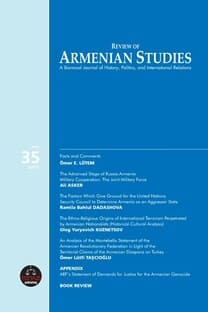Bir Sultanı Öldürmek - II. Abdülhamitʼe Suikast Girşiminin Uluslararası Tarihi (1905)
The 1905 Yıldız assassination attempt has been described as “one of the greatest and most sensational political conspiracies of modern times”. In each chapter of this book, the subjects regarding the Yıldız attempt are approached from various aspects. The numerous variables, the parties of the attempt’s background, the actualization and aftermath are evaluated together with the developments peculiar to the geographies and the time period. It is understood that many of the variables and developments were interrelated. Among these variables and developments were contemporary capitalism, nationalism, socialism, mass media, internationalism, interstate collaboration, humanitarianism, international law, and orientalist beliefs. It is stated that one of this book’s objectives is to better understand the intersections between ideology and application, states, and nationalist movements. The authors add their own evaluations to various subjects and refer to the evaluations of others, including those of historians. Moreover, flawed opinions are mentioned and the errors and deficiencies in these common opinions are explained. In the introduction, it is expressed that this book, which analyzes the conspiracy that resulted in the assassination attempt and the subsequent developments in depth, provides a unique opportunity to re-evaluate in which ways the histories of the Ottoman Empire, Europe, and the rest of the World were interrelated and to contemplate on many unanswered questions.
Anahtar Kelimeler:
Osmanlı İmparatorluğu, II. Abdülhamid, 1905 Yıldız suikast girişimi
To Kill A Sultan - A Transnational History Of The Attempt On Abdülhamid II (1905)
The 1905 Yıldız assassination attempt has been described as “one of the greatest and most sensational political conspiracies of modern times”. In each chapter of this book, the subjects regarding the Yıldız attempt are approached from various aspects. The numerous variables, the parties of the attempt’s background, the actualization and aftermath are evaluated together with the developments peculiar to the geographies and the time period. It is understood that many of the variables and developments were interrelated. Among these variables and developments were contemporary capitalism, nationalism, socialism, mass media, internationalism, interstate collaboration, humanitarianism, international law, and orientalist beliefs. It is stated that one of this book’s objectives is to better understand the intersections between ideology and application, states, and nationalist movements. The authors add their own evaluations to various subjects and refer to the evaluations of others, including those of historians. Moreover, flawed opinions are mentioned and the errors and deficiencies in these common opinions are explained. In the introduction, it is expressed that this book, which analyzes the conspiracy that resulted in the assassination attempt and the subsequent developments in depth, provides a unique opportunity to re-evaluate in which ways the histories of the Ottoman Empire, Europe, and the rest of the World were interrelated and to contemplate on many unanswered questions.
Keywords:
Ottoman Empire, Abdülhamid II, 1905 Yıldız assassination attempt,
___
- Alloul, Houssin, Edhem Eldem & Henk de Smaele, To Kill A Sultan - A Transnational History of the Attempt on Abdülhamid II (1905). London, Palgrave Macmillan, 2018
- ISSN: 1303-5304
- Yayın Aralığı: 2
- Başlangıç: 2002
- Yayıncı: Terazi Yayıncılık Basım Dağıtım Danışmanlık Eğitim Organizasyon Matbaacılık Kırtasiye Tic. Ltd. Şti.
Sayıdaki Diğer Makaleler
Bir Sultanı Öldürmek - II. Abdülhamitʼe Suikast Girşiminin Uluslararası Tarihi (1905)
Dağlık Karabağ Uyuşmazlığında Self-Determinasyon Tezlerinin Göreceliği
THE RELATIVITY OF SELF-DETERMINATION CONCEPTIONS REGARDING THE NAGORNO-KARABAKH CONFLICT
TO KILL A SULTAN - A TRANSNATIONAL HISTORY OF THE ATTEMPT ON ABDÜLHAMİD II (1905)
